|
|
|
Sort Order |
|
|
|
Items / Page
|
|
|
|
|
|
|
| Srl | Item |
| 1 |
ID:
118311
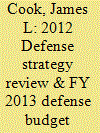

|
|
|
|
|
| Publication |
2013.
|
| Summary/Abstract |
Regardless of whether one is a supporter or a critic, some additional analysis regarding the formulation of the new defense strategic guidance is useful to better understand the rationale for changing defense priorities, the magnitude and impact of these changes within the Department of Defense (DOD), and the review process itself. Specifically, three questions warrant further examination: 1) Why was a DoD-level defense strategy review necessary, given the 2010 Quadrennial Review? 2) What are the implications of this new strategic guidance for the DoD? 3) What are the strategic risks? These questions are addressed by assessing the defense strategic guidance through the lens of strategy and its components: ends, ways, means and risk.
The United States of America is the greatest force for freedom and security that the world has ever known. And in no small measure, that's because we've built the best-trained, best-led, best-equipped military in history - and as Commander-in-Chief, I'm going to keep it that way.
|
|
|
|
|
|
|
|
|
|
|
|
|
|
|
|
| 2 |
ID:
118313


|
|
|
|
|
| Publication |
2013.
|
| Summary/Abstract |
China's rapid rise in economic and military power has occurred alongside the apparent decline of Japan, which has traditionally been America's closest ally in the post-World War II era. These shifting fortunes have led policymakers in all three capitals to reassess security relationships with the other two. This article predicts that, absent marked changes in the current distribution of power, Washington must deal with China as an equal partner while expecting that Japan will try to placate both sides even as it remains closer to Washington.
|
|
|
|
|
|
|
|
|
|
|
|
|
|
|
|
| 3 |
ID:
118309
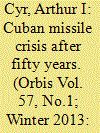

|
|
|
|
|
| Publication |
2013.
|
| Summary/Abstract |
The fiftieth anniversary of the October 1962 Cuban missile crisis is an appropriate time to review the events, which arguably were the closest the world has come to general nuclear war. The crisis was preceded by growing tensions between Moscow and Washington, and increasing Cuba emphasis in U.S. domestic politics. Analysts have differed on motives for trying to place long-range missiles in Cuba; Soviet officials consistently emphasized defense of Cuba. Revelations since the crisis indicate war was even closer than realized at the time. President John F. Kennedy deserves considerable credit for resisting military pressures.
The Cuban Missile Crisis of October 1962 arguably was the closest the world has come to nuclear war since the beginning of the nuclear era in 1945, and for that reason alone has been the focus of notable theatrical and literary products as well as scholarly analysis. The crisis has been described as President John F. Kennedy's "finest hour" in a touchingly brief tenure in the White House, and also as the direct result of weakness and miscalculation in the administration of that same American chief executive. Crisis management, a popular subject for analysis even before the crisis, received a major boost in visibility as a result of this unprecedented confrontation. The colorful personalities involved on both sides, including unpredictable Soviet Premier (Chairman of the Council of Ministers) Nikita Khrushchev, as well the photogenic and public relations-conscious U.S. leader, and some of their immediate advisers, have added to both human interest and dramatic potential. Finally, the crisis led to changes in strategic policies on the part of the United States and the Soviet Union, and their immediate allies. For these reasons and others, the half-century anniversary of the events merit a fresh look, both to review previous analyses and discuss lessons which bear on present-and future-international relations.1
The perceptions and conclusions among informed students of the Cuban Missile Crisis generally have shifted over the decades. At least in the United States, and among the international strategic studies community more generally, the initial reactions were generally laudatory of Kennedy and his men. Nuclear war had been avoided, while the goal of the removal of Soviet missiles from Cuba was achieved. Walt W. Rostow, a member of the Kennedy administration who later became national security adviser to President Lyndon B. Johnson, described the crisis as "the Gettysburg of the Cold War," a characteristic observation from this highly theoretical academic, but one which reflected wider sentiment. Later in the 1970s, as plots involving the U.S. government in efforts to assassinate Fidel Castro came to light, the Kennedy administration was regarded in a more critical light. During the same decade, information became public regarding JFK's reckless behavior in his personal life. That led at least some to analyze policies and politics of his administration with a much more critical perspective.2
|
|
|
|
|
|
|
|
|
|
|
|
|
|
|
|
| 4 |
ID:
118314
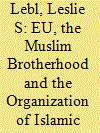

|
|
|
|
|
| Publication |
2013.
|
| Summary/Abstract |
The European Union (EU), the Muslim Brotherhood, and the Organization of Islamic Cooperation (OIC) are locked in a struggle for the future of Europe that encompasses very different visions. The EU aims for a highly sophisticated Western civilization; the Brotherhood and OIC see Europe as part of a future global Caliphate, an Islamic empire governed by an Islamist version of traditional Islamic law, or sharia. This competition extends to the United Nations where the OIC is seeking to enforce global prohibitions on criticism of Islam. A comparison of the EU's actions with those of the U.S. federal government shows that U.S. policymakers, in confronting a similar challenge, are making many of the same errors as their European counterparts.
|
|
|
|
|
|
|
|
|
|
|
|
|
|
|
|
| 5 |
ID:
118318
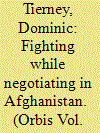

|
|
|
|
|
| Publication |
2013.
|
| Summary/Abstract |
America's experience of fighting while negotiating in the Korean War and the Vietnam War offers valuable lessons for understanding the current peace talks in Afghanistan: the adversaries are averse to making concessions; violence is a bargaining tool; the fate of captives can derail negotiations; alliances may be strained; broader regional dynamics are critical, and the peace process is imbued with symbolism.
In 2010, with the blessings of U.S. and British intelligence, the Afghan regime engaged in high-level peace talks with a senior Taliban leader, Mullah Akhtar Muhammad Mansour. Unfortunately, after handing over tens of thousands of dollars to encourage Mansour's participation, the supposed Taliban leader turned out to be an impostor. Who sent him, and for what reason, is unknown-although suspicions have fallen on the Pakistani intelligence services.
|
|
|
|
|
|
|
|
|
|
|
|
|
|
|
|
| 6 |
ID:
118310


|
|
|
|
|
| Publication |
2013.
|
| Summary/Abstract |
Many commentators now contend that America's power is in relative or absolute decline. However, Declinists overstate their argument, as America has both a commanding amount of residual power and many enduring strengths. Decline, absolute or relative, is not predetermined. However, retaining our influence and preserving our ability to protect and advance U.S. interests does require addressing key shortfalls in strategic priorities to ensure synergies among the components of U.S. national power. A variety of strategies- particularly Offshore Balancing- have been offered to better balance ends, ways and means. These alternatives suffer from policy, historical and implementation challenges. A hybrid solution, Forward Partnering, avoids these deficiencies and is presented as an alternative grand strategy.
|
|
|
|
|
|
|
|
|
|
|
|
|
|
|
|
| 7 |
ID:
118316
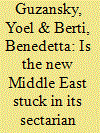

|
|
|
|
|
| Publication |
2013.
|
| Summary/Abstract |
This article focuses on the impact of the Arab Spring on pre-existing societal cleavages, specifically analyzing its impact on Sunni-Shiite relations. How have Sunni-Shiite relationships been reshaped by the ongoing social protests? Is there a rise in the inter-religious tensions among Sunni and Shiite communities across the region? And, if that is the case, what are the implications of this trend on both the region's potential for democratization, as well as on its overall stability and security?
|
|
|
|
|
|
|
|
|
|
|
|
|
|
|
|
| 8 |
ID:
118315
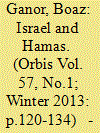

|
|
|
|
|
| Publication |
2013.
|
| Summary/Abstract |
Inarguably, the Islamist revolutions in the Arab countries' neighboring Israel, and the Muslim Brotherhood's rise to power in these countries, presents Israel with many, perhaps unprecedented, political and security challenges. However, in assessing the threat to its southern border, Israel must analyze in depth the intra- and extra-organizational influences on Hamas's motivation to attack, and formulate a responsible policy to ensure the safety of its citizens. Israel must use every means at its disposal to influence and pressure Hamas's leadership to choose responsibly, and avoid dangerous military "adventures."
|
|
|
|
|
|
|
|
|
|
|
|
|
|
|
|
| 9 |
ID:
118317


|
|
|
|
|
| Publication |
2013.
|
| Summary/Abstract |
Saudi Arabia has positioned itself among the primary mediators in some of the Middle East's most intractable conflicts, having played central mediatory roles in Lebanon, Palestine, and in Arab-Israeli conflict. Compared with the mediation efforts of another frequent regional mediator, namely Qatar, Saudi mediation initiatives tend to be more institutionally grounded and are less personal in nature, and often involve less fanfare and are more discreet. At the same time, the Kingdom is not always readily identified with its satellite media network of Al Arabiya in the same way that Qatari foreign policy is perceived to be closely aligned with Al Jazeera coverage. Although such efforts have seldom resulted in successful resolution of conflicts among the disputants involved, the Kingdom has used mediation to successfully further its twin objectives of ensuring and furthering state and regime security, while also playing a central coordinating role in regional affairs. As such, Saudi Arabia is likely to continue to play a similar mediatory role in the foreseeable future.
|
|
|
|
|
|
|
|
|
|
|
|
|
|
|
|
| 10 |
ID:
118312
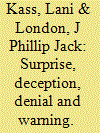

|
|
|
|
|
| Publication |
2013.
|
| Summary/Abstract |
This article frames the highly complex national security challenges of surprise, denial and deception. These ultimate asymmetric threats exploit vulnerabilities, capitalizing on hubris, complacency and self-delusion. Such actions prevent the full and accurate assessment of opponents' capabilities and intentions, and hinder appropriate actions. The long and frequent history of surprise, denial and deception suggest that these are essentially psychological phenomena. They are effective because they challenge and exploit perceptions that fill the gap between what is known and unknown. The authors present decision superiority as the fusion of information dominance and decisive action. Technology and intelligence can enhance decision superiority by ameliorating, but not eliminating, the limits of human perception. Translating knowledge into capabilities and actions requires agile, adaptive processes and open institutional collaboration within the interagency, with global allies and the private sector.
|
|
|
|
|
|
|
|
|
|
|
|
|
|
|
|
|
|
|
|
|